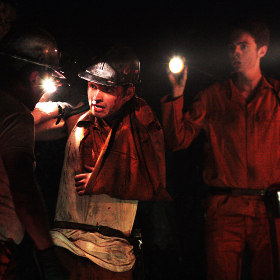Land of Our Fathers

© Flavia Fraser-Cannon
Chris Urch‘s Land of Our Fathers is a dark, claustrophobic drama with a great deal of heart. Trapped down a coal mine in deepest, darkest Wales, a group of miners contemplate life, love and mortality, with just a couple of biscuits and their own effluence for company.
Signe Beckmann‘s inspired design lowers 503’s ceiling and creates walls and floors of coal, transforming the space and helping the – increasingly overheated – audience to empathise with the miners, who are stuck down the shaft for two weeks following a rock fall. The group aren’t bosom buddies, but needs must, and relationships blossom and wither under the strain of the situation. Urch’s writing delineates each character successfully, while director Paul Robinson finds an effective balance between subtle moments and raw blasts of emotion.
As deputy Chopper, Patrick Brennan is eminently watchable, set apart from his men, separated both physically and, increasingly, mentally, but it’s Joshua Price‘s Mostyn who really keeps the whole thing bouncing along – it’s hard to believe that Price is still at drama school, such is his sense of poise and comic timing, as well as his ability to show character development.
Mostyn, the youngest of the group, builds a strong relationship with Clive Merrison‘s Bomber, developing their relationship from fractious and sparky to start with (Mostyn’s nickname Julie being an early casualty of his admitting to enjoying musical theatre) to affectionate, dancing together as Bomber teaches him how to ‘woo’; Mostyn returns the favour later on, standing up for the sharp and difficult Bomber when he is no longer able to defend himself.
While the play is slow to get started, and Paul Prescott’s accent sounds more faux-Italian than Polish, the cast is strong, pulling through an uneven opening into a strong middle and end section. Worthy of note is Kyle Rees, doing great work as guilt-stricken Curly, who hankers after something he can’t even admit to himself, as well as taking on great chunky Ridley-esque monologues and delivering them beautifully.
This isn’t the first thing Urch has written, but it shows huge promise for the future – as the two weeks of solitude drip by and despondency sets in with each failed attempt at rescue, the sense of claustrophobia, panic and urgency really set in, leaving you sad and not a little shaken.










